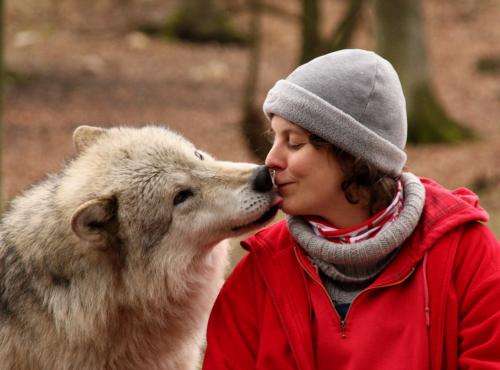Domestication of dogs may have elaborated on a pre-existing capacity of wolves to learn from humans

Wolves can learn from observing humans and pack members where food is hidden and recognize when humans only pretend to hide food, reports a study for the first time in the open-access journal Frontiers in Psychology. These findings imply that when our ancestors started to domesticate dogs, they could have built on a pre-existing ability of wolves to learn from others, not necessarily pack members.
A paper published recently in the journal Science suggested that humans domesticated dogs about 18 thousand years ago, possibly from a European population of grey wolves that is now extinct. But it remains unknown how much the ability of dogs to communicate with people derives from pre-existing social skills of their wolf ancestors, rather than from novel traits that arose during domestication.
In a recent study, Friederike Range and Zsófia Virányi from the Messerli Research Institute at the University of Veterinary Medicine Vienna investigated if wolves and dogs can observe a familiar "demonstrator" – a human or a specially trained dog – to learn where to look for food within a meadow. The subjects were 11 North American grey wolves and 14 mutts, all between 5 and 7 months old, born in captivity, bottle-fed, and hand-raised in packs at the Wolf Science Center of Game Park Ernstbrunn, Austria.
The wolves and dogs were two to four times more likely to find the snack after watching a human or dog demonstrator hide it, and this implies that they had learnt from the demonstration instead of only relying on their sense of smell. Moreover, they rarely looked for the food when the human demonstrator had only pretended to hide it, and this proves that they had watched very carefully.
The wolves were less likely to follow dog demonstrators to hidden food. This does not necessarily mean that they were not paying attention to dog demonstrators: on the contrary, the wolves may have been perceptive enough to notice that the demonstrator dogs did not find the food reward particularly tasty themselves, and so simply did not bother to look for it.
The researchers conclude that the ability to learn from other species, including humans, is not unique to dogs but was already present in their wolf ancestors. Prehistoric humans and the ancestors of dogs could build on this ability to better coordinate their actions.
More information: Observing humans and conspecifics: social learning in dogs and wolves, Frontiers in Psychology , DOI: 10.3389/fpsyg.2013.00868
Journal information: Frontiers in Psychology , Science
Provided by Frontiers

















